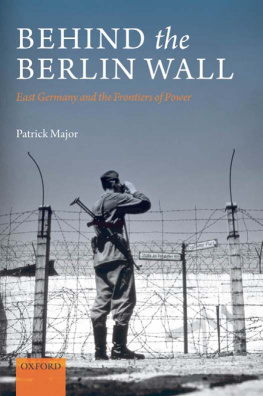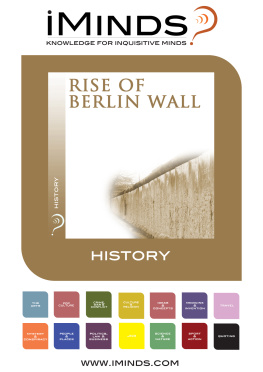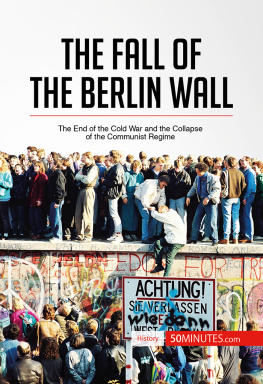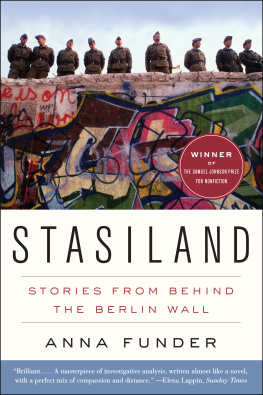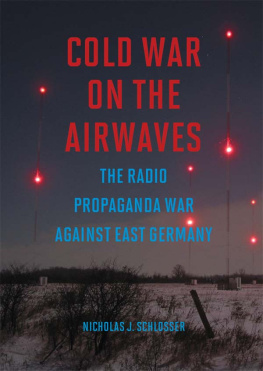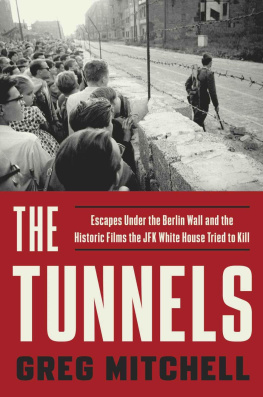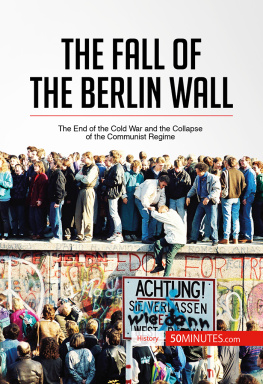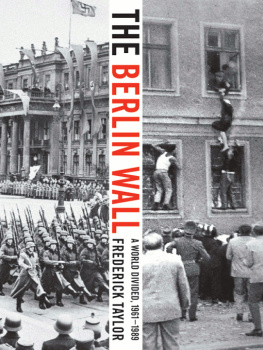Patrick Major - Behind the Berlin Wall: East Germany and the Frontiers of Power
Here you can read online Patrick Major - Behind the Berlin Wall: East Germany and the Frontiers of Power full text of the book (entire story) in english for free. Download pdf and epub, get meaning, cover and reviews about this ebook. City: Be, year: 2011, publisher: Oxford University Press, genre: Politics. Description of the work, (preface) as well as reviews are available. Best literature library LitArk.com created for fans of good reading and offers a wide selection of genres:
Romance novel
Science fiction
Adventure
Detective
Science
History
Home and family
Prose
Art
Politics
Computer
Non-fiction
Religion
Business
Children
Humor
Choose a favorite category and find really read worthwhile books. Enjoy immersion in the world of imagination, feel the emotions of the characters or learn something new for yourself, make an fascinating discovery.
- Book:Behind the Berlin Wall: East Germany and the Frontiers of Power
- Author:
- Publisher:Oxford University Press
- Genre:
- Year:2011
- City:Be
- Rating:5 / 5
- Favourites:Add to favourites
- Your mark:
Behind the Berlin Wall: East Germany and the Frontiers of Power: summary, description and annotation
We offer to read an annotation, description, summary or preface (depends on what the author of the book "Behind the Berlin Wall: East Germany and the Frontiers of Power" wrote himself). If you haven't found the necessary information about the book — write in the comments, we will try to find it.
Few historical changes occur literally overnight, but on August 13 1961 eighteen million East Germans awoke to find themselves walled in by an edifice which was to become synonymous with the Cold War: the Berlin Wall. This new history rejects traditional, top-down approaches to Cold War politics, exploring instead how the border closure affected ordinary East Germans, from workers and farmers to teenagers and even party members, caught out by Sunday the Thirteenth. Party, police and Stasi reports reveal why one in six East Germans fled the country during the 1950s, undermining communist rule and forcing the eleventh-hour decision by Khrushchev and Ulbricht to build a wall along the Cold Wars frontline. Did East Germans resist or come to terms with immurement? Did the communist regime become more or less dictatorial within the confines of the so-called Antifascist Defense Rampart? Using film and literature, but also the GDRs losing battle against Beatlemania, Patrick Majors cross-disciplinary study suggests that popular culture both reinforced and undermined the closed society. Linking external and internal developments, Major argues that the GDRs official quest for international recognition, culminating in Ostpolitik and United Nations membership in the early 1970s, became its undoing, unleashing a human rights movement which fed into, but then broke with, the protests of 1989. After exploring the reasons for the fall of the Wall and reconstructing the heady days of the autumn revolution, the author reflects on the fate of the Wall after 1989, as it moved from demolition into the realm of memory.
Few historical changes occur literally overnight, but on 13 August 1961 eighteen million East Germans awoke to find themselves walled in by an edifice which was to become synonymous with the Cold War: the Berlin Wall.
This new history rejects traditional, top-down approaches to Cold War politics, exploring instead how the border closure affected ordinary East Germans, from workers and farmers to teenagers and even party members, caught out by Sunday the Thirteenth. Party, police, and Stasi reports reveal why one in six East Germans fled the country during the 1950s, undermining communist rule and forcing the eleventh-hour decision by Khrushchev and Ulbricht to build a wall along the Cold Wars frontline.
Did East Germans resist or come to terms with immurement? Did the communist regime become more or less dictatorial within the confines of the so-called Antifascist Defence Rampart? Using film and literature, but also the GDRs losing battle against Beatlemania, Patrick Majors cross-disciplinary study suggests that popular culture both reinforced and undermined the closed society. Linking external and internal developments, Major argues that the GDRs official quest for international recognition, culminating in Ostpolitik and United Nations membership in the early 1970s, became its undoing, unleashing a human rights movement which fed into, but then broke with, the protests of 1989. After exploring the reasons for the fall of the Wall and reconstructing the heady days of the autumn revolution, the author reflects on the fate of the Wall after 1989, as it moved from demolition into the realm of memory.
Patrick Major: author's other books
Who wrote Behind the Berlin Wall: East Germany and the Frontiers of Power? Find out the surname, the name of the author of the book and a list of all author's works by series.

